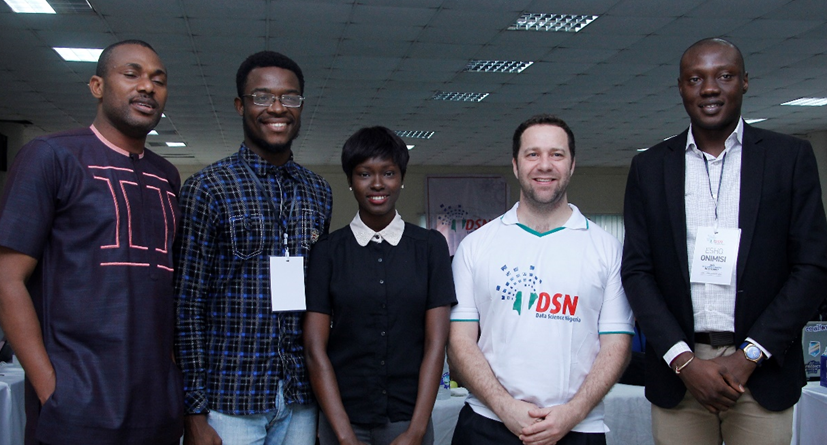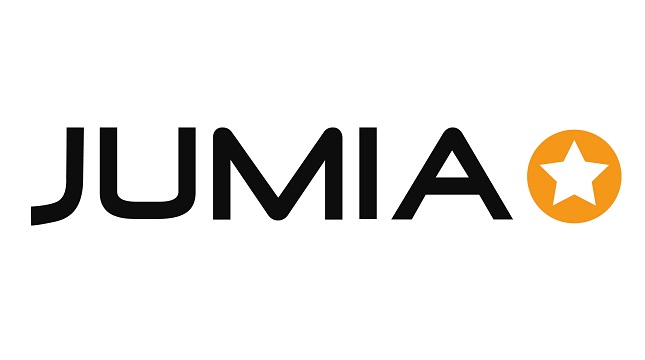E-Business
OAU Undergraduate, Adeola Wins Data Science Nigeria Bootcamp Hackathon

By peter oluka
Adeola Balogun, a young female 400-level Computer Science undergraduate from the Obafemi Awolowo University, Ile Ife, has won the Data Science Nigeria (DSN) bootcamp hackathon.
The bootcamp included very intensive hands-on classes, group learning sessions, and three individual hackathons, featuring a hands-on focus on machine learning algorithms, engineering statistics, and the broad principles of data science applications in solving real word problems.
The learning sessions were spiced up with three ongoing hackathons aimed to stimulate the 150 participants, who qualified for the bootcamp through pre-qualification exams on Microsoft/Edx Data Science MOOC series and DataCamp followed by a public Kaggle competition.
In his welcome address, the bootcamp convener, Mr. Bayo Adekanmbi, MTN’s Executive, said “We must focus on world-class capacity building in a consistent and rigorous manner if we truly want to build high-impact analytics products that can accelerate our national development and position Nigeria to become the data science hub for the continent, with the potential to access as much as 10% of the global data analytics outsourcing market, which is expected to garner $5.9 billion by 2020”.
At the award ceremony, Adeola said, “I only started taking data science three weeks ago, but I have carefully followed the instructions and guidance provided by the instructor to become the first on the competition leader board.”
Adeola Balogun began programming in Python during her 200-level classes. She is passionate about encouraging ladies interested in programming in Python, and she complements her academic studies by working as an intern with the Elo Umeh-led Terragon Group.
She is also an advocate for the Women Techmakers movement, and a Google Ambassador on her campus.
The other top four participants in the Kaggle competition are Chibueze Oguejiofor, Onimisi Esho, Sarah Adeola, and Aminu Onimisi Abdulsalami.
According to the participants, the bootcamp was an eye-opening, skill sharpening, and rigorous experience that provided a full immersion in the realities of the field. Data Science has been rated the number one career in the USA today, according to Glassdoor’s Best Jobs in America list for both 2016 and 2017.
The bootcamp participants also had chance to learn from leading industry experts, who shared real world information about the intersection of data science and machine learning for solving business problems. Mr Ladi Aduni, Associate Director, Technology Advisory KPMG led the briefing on the KPMG-sponsored Segmentation Hackathon at the bootcamp.
The hackathon required participants to use unsupervised learning to group banking customers based on many unrelated variables. The top-rated participants in this hackathon will qualify for internships and possible job placements at KPMG Nigeria.
Mr. Ngozi Dozie of OneFi discussed how to build industry-ready algorithms that can solve real-world problems, using the example of how weather forecasting correlates with loan defaults.
He said, “When the weather is bad, people default more on their loans, and data science must be able to explore other non-obvious variables in making business prediction solutions”.
Mr Usoro Usoro, General Manager of Digital Financial Services at MTN Nigeria engaged the participants on how to leverage the robust intelligence of big data algorithms to unravel local opportunities in the payments and lending fields.
Professor Raj Krishnan, a Microsoft Azure expert and adjunct professor at the Illinois Institute of Technology in Chicago, led a hands-on immersion in machine learning using the cloud-based Azure platform.
Dr Johnson Iyilade, the Founder and CEO of Glomacs IT Solutions and Services contributed from Canada, exploring how we have moved from a system-centric to user-centric connected data architecture, featuring practical explorations of the major big data technologies (Hadoop, HDFS, MapReduce, etc.).
Wale Akinfaderin, a doctoral researcher and expert data scientist, dialled in from the USA to discuss feature engineering, data preparation, over fitting, and managing missing data (including mean, median, mode, regressed value and even nearest neighbour values).
E-Business
NDPC, 60 DPAs Collaborate on Enforcing Privacy Rights in the Use of Al

Nigeria Data Protection Commission (NDPC) has joined sixty (60) other Data Protection Authorities (DPAs) in endorsing the “Joint Statement on Al-Generated Imagery and the Protection of Privacy.”

NDPC
The Joint Statement was coordinated by the International Enforcement Cooperation Working Group (IEWG) of the Global Privacy Assembly.
This underscores the growing concerns regarding the privacy risks posed by Artificial Intelligence tools capable of generating realistic images and videos of identifiable individuals.
The Joint Statement highlights concerns over the misuse of Al-powered tools to create non-consensual imagery, defamatory content, and other harmful materials, particularly affecting children and vulnerable groups.
It calls on organisations to implement strong safeguards, ensure transparency, provide effective content removal mechanisms, and comply fully with applicable data protection laws.
The current effort forms part of a continuum of steps being taken by Nigeria to ensure the responsible use of Al. It will be recalled that the Honourable Minister of Communications, Innovation and Digital Economy, Dr ‘Bosun Tijani, led the initiative for the development of the National Al Strategy.
The NDPC also issued the General Application and Implementation Directive (GAID), which, amongst others, mandates privacy by design and privacy by default in the development and deployment of Al tools.
The National Commissioner/CEO of the NDPC, Dr Vincent Olatunji, has directed that the Nigeria Data Protection Act (NDP Act) Compliance Audit Returns (CAR) by data controllers and processors of major importance will serve as a yardstick for monitoring and evaluating responsible use of Al for data processing in Nigeria.
E-Business
Jumia Tech Week 2026 Begins with Tech Deals on Smartphones, Electronics, and Everyday Technology

Jumia Nigeria has announced the launch of Jumia Tech Week 2026, a two-week campaign offering customers access to discounted technology products across key categories, including smartphones, computing, home entertainment, and wearable devices.

Starting from March 2 to March 15, Jumia Nigeria’s Tech Week 2026 is themed ‘Tech Products for Less’ – a deliberate commitment by the e-commerce giant to drive down the cost of technology products for Nigerian consumers. The campaign offers significant price reductions across key product categories, enabling more Nigerians to access the devices they need at prices that reflect the company’s dedication to affordability and consumer value.
Jumia Tech Week will feature deals across a wide range of product categories, including mobile phones, computer systems and accessories, televisions and audio equipment, gaming products, home appliances, portable power solutions, health technology,, and wearable devices.
Customers will also have access to curated recommendations, including top smartphone deals, must-have accessories, gaming essentials, and home technology upgrades.
According to Temidayo Ojo, CEO of Jumia Nigeria, the campaign reflects Jumia’s broader commitment to making everyday technology more accessible to Nigerians.
“Technology has become an essential part of everyday life, and access to the right devices enables more people to participate fully in the digital economy,” said Ojo. “At Jumia, we remain focused on expanding access and improving the shopping experience as we continue to build Nigeria’s everyday retail destination.”
The campaign will include a range of customer engagement initiatives such as flash sales, brand days, anchor deals and interactive activities designed to enhance the online shopping experience.
Special highlight periods, described as Explosion Days, will take place on March 6 and March 13, featuring limited-time offers across selected technology categories. Customers will also be able to participate in interactive activities, including product-based games, treasure hunts,, and live shopping sessions during the campaign period.
The campaign will feature participation from leading brands including Oraimo, Silver Crest, Samsung, Ecoflow, Nivea and Aeon, offering customers a wide selection of technology, household and lifestyle products. Early access promotions already begun during the teaser period from February 16 to March 1, allowing customers to preview selected deals ahead of the official launch.
Jumia Tech Week forms part of the company’s broader strategy to expand e-commerce adoption by improving access to essential products and enhancing the customer experience across its platform. As Nigeria’s e-commerce market continues to grow, Jumia remains focused on strengthening its product assortment, logistics capabilities, and digital experience to serve customers better nationwide.
Customers can participate in the campaign by using the Jumia mobile app or visiting the Jumia website and following the conversation online using #JumiaTechWeek.
E-Business
House Queries NDIC: ₦5m Max Payout for Failed Bank Depositors

Nigeria Deposit Insurance Corporation (NDIC) pays between ₦2 million and ₦5 million as deposit insurance to customers of liquidated banks, Managing Director Thompson Oludare Sunday told the House Committee on Insurance and Actuarial Matters during 2026 budget defence.

NDIC
House Spokesperson Akin Rotimi Jr sought details on depositor entitlements, citing Heritage Bank’s June 2024 collapse and public concerns over financial confidence.
Sunday explained NDIC’s mandate: banks pay risk-based premiums (now under 1%, down from 15/16 of 1%) to guarantee deposits. Coverage is ₦5 million for deposit money banks, primary mortgage banks (PMBs), and microfinance banks (MMOs); ₦2 million for other financial institutions.
Using BVN, NDIC auto-pays guaranteed sums without visits for amounts up to the limit. For Heritage, post-revocation, NDIC liquidated assets—selling buildings, recovering loans, realizing investments—and paid a second ₦24.63 billion dividend on January 6.
“Anything above ₦5 million or ₦2 million depends on recoveries,” Sunday said, noting ongoing asset sales and debt chases.
Committee Chairman Ahmed Jaha Babawo commended the clarity, noting the limit rose from ₦500,000 to ₦5 million recently. Over 90% of Heritage depositors got insured sums in under four days, meeting International Resolution Deposit (IRD) standards.
Babawo added liquidation dividends would be discussed in executive session.

 E-Financial3 days ago
E-Financial3 days agoIran-Israel-US Conflict and CBN’s FX Gains: A Stress Test for Nigeria’s Monetary Stability

 E-Financial3 days ago
E-Financial3 days agoMutual Benefits Assurance Reaffirms Full Regulatory Compliance, Enhanced Governance

 General News3 days ago
General News3 days agoJAMB Uncovers AI-Driven Fraud Targeting UTME Candidates, Warns Parents

 Telecom2 days ago
Telecom2 days agoSunil Bharti Mittal Conferred GSMA Lifetime Achievement Award for Transforming Global Telecommunications

 General News3 days ago
General News3 days agoSERAP Asks FCCPC to Investigate Google, Meta, Others over Alleged Rights Abuses

 News3 days ago
News3 days agoTeamApt, Awabah Partner to Boost Pension Drive for Nigerians

 News3 days ago
News3 days agoFlashChange CEO, Bidemi Oke, Urges Startups to Build Strong Governance Structures Early

 Telecom2 days ago
Telecom2 days agoWhy Digital Trust Matters: Secure, Responsible AI for African SMEs?


























